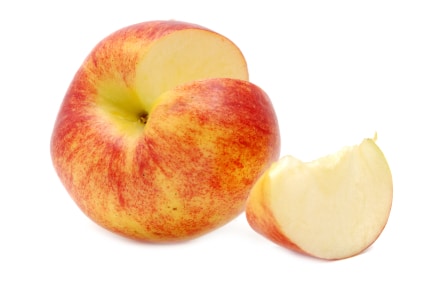
This latter is due to the significant part they can play in maintaining a healthy digestive tract. The insoluble fiber in them provides bulk which holds water to cleanse and move food quickly through the intestinal tract. Jan de Vries, naturopath, and nutritionist say that as well as helping to prevent constipation, eating apples can also ward off diarrhea, and guard against rheumatism, and fatigue. He describes the fruit as ‘wonderful food for people with coronary artery disease and diabetes.’ Apples have a detoxifying effect, which can assist in increasing vigor and regaining full strength when convalescing from illness. The flavonoids and antioxidants they contain improve immune function as well as helping to prevent heart disease.
The cellulose (roughage) in an apple assists digestion and elimination and the pectin also helps prevent constipation. But what exactly is pectin? It’s defined by the Food Standards Agency as a ‘heterogeneous grouping of acidic structural polysaccharides, found in fruit and vegetables.’ If this leaves you none the wiser, let’s turn to the dictionary, where pectin is defined as ‘a soluble gelatinous substance found in ripe fruits.’ It is probably more useful to know what it does rather than what it is: pectin (being a soluble fiber) helps prevent ‘bad’ cholesterol build-up in the lining of blood vessel walls, thus reducing the propensity to atherosclerosis and heart disease. It also has the effect of helping to retain water in the large intestine which in turn prevents constipation.
Apples contain fewer vitamins than many other fruits, but do contain C (8mg per one medium sized, raw apple) and A. The vitamins are in and near the peel, so it is wise to eat them whole, but wash them well first (if not organic) because of insecticides. They also contain potassium, calcium, phosphorus, and iron, but no sodium, fat or cholesterol, so they make an ideal snack; raising the blood sugar slowly and keeping it high.
Tammi Flynn was nutrition director at a gym in Wenatchee, Washington. After seeing the results in one of her clients from simply eating three apples a day (one before each meal) she began to recommend the practice to her other clients with impressive results and now recommends this as part of a healthy diet to provide a foundation for permanent fat loss.
Apples can play their part in maintaining healthy teeth and gums – the fiber cleans the teeth and massages the gums while the antiviral properties of apples help reduce bacteria. Beware, however, of very sweet apples, as the sugar in them might not be so helpful for your teeth.
Face packs of apple and honey or apple and milk can help to improve the look and feel of your skin.
Related Articles By Cathe:
The Hidden Fat Loss Potential of Apples
How a Hormone Released by Your Heart Helps With Fat Loss
Can an Ingredient in Apple Peels Fight Obesity?
The Strange Ingredient in Apples That May Help with Muscle Hypertrophy
Safe Metabolism Boosters: Science Reveals New Ways to Burn More Fat

